News
This website is currently under review, users might encounter missing information on this page. Sign up for our newsletter!
Wykoff responds to “unprecedented uncertainty” in public health practice

As the field of public health faces increasingly complex and unpredictable challenges, a new editorial in Journal of Public Health Management & Practice calls on current and future public health leaders to pursue thoughtful and adaptive leadership. The editorial, “Addressing Unprecedented Uncertainty in Public Health: Advice for Current and Future Leaders,” is authored by Dr. Randy Wykoff, dean of the East Tennessee State University College of Public Health and Dr. Donna Petersen, former dean of the University of South Florida College of Public Health.
The article argues that longstanding assumptions in public health practice are being challenged by rapidly shifting conditions, making uncertainty the new norm. The authors discuss the importance of maintaining trust by engaging in transparent communication when scientific guidance might be evolving or ambiguous. Read more...
Meit reviews CDC rural health training program

Michael Meit, Director of the Center for Rural Health and Research, served an advisor and content reviewer for a major new rural health training program from the Centers for Disease Control and Prevention. Developed by the NORC Walsh Center for Rural Health Analysis, the course cover the following topics:
Introduction to Rural Public Health
Partnering with Rural Communities for Public Health Communications
Risk Management in Rural Communities
Leadership Skills
Conflict Resolution
The course was funded by the CDC Office of Rural Health, directed by Dr. Diane Hall, a member of the College of Public Health Advisory Board. Read more...
CRHR to serve as evaluator on $9.2 Million ARC-funded Connect Appalachia project

The Appalachian Regional Commission recently awarded $9.2 million in ARISE funds to the Fletcher Group, Inc. to launch Connect Appalachia, a regional workforce and recovery initiative that will support individuals in recovery from substance use disorder across six Appalachian states. The East Tennessee State University Center for Rural Health and Research (CRHR) will serve as the project evaluator.
Connect Appalachia will provide job readiness training and job placement services to 1,500 participants in recovery across Georgia, Kentucky, North Carolina, Tennessee, Virginia and West Virginia. The project will also serve 2,500 businesses and offer training and technical assistance to 252 communities throughout the region. Read more...
Quality of life, the environment, and how one affects the other
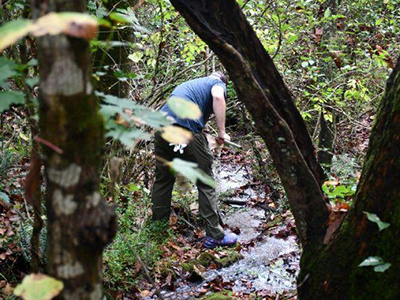
A collaboration between groups across Tennessee assessed over 60 factors that affect quality of life in the state, including factors that involve the environment, like water quality and access to outdoor spaces.
Counties in Northeast Tennessee mostly have more access to spaces for physical activity compared to the state as a whole, with some exceptions. But counties in the region also, comparatively, have a higher amount of water quality violations.
“Natural environments play a very important role in residents’ both physical and mental wellbeing,” said Qian Huang, a research assistant professor at ETSU’S Center for Rural Health and Research and College of Public Health. Read more...
New tool measures quality of life in Tennessee

Tennesseans now have a new way to explore the factors that impact livability in communities across the state, thanks to a publicly accessible tool that provides county-level data on a range of topics that contribute to quality of life.
The Tennessee Livability Dashboard compiles more than 60 indicators spanning housing, transportation, education, health care, employment and other key measures of livability.
It’s the latest initiative from the Tennessee Livability Collaborative — a group of 26 state agencies, departments, commissions and academic institutions — and was developed by East Tennessee State University’s Center for Rural Health and Research (CRHR).
“The dashboard provides a one-stop, accessible way to explore the factors shaping quality of life in Tennessee,” said Dr. Qian Huang, a research assistant professor with the CRHR and ETSU College of Public Health. Read more...
Experts urge caution, focus on proven interventions as WV celebrates decrease in fatal overdoses

East Tennessee State University (ETSU) is partnering with Virginia Polytechnical Institute
and State University (Virginia Tech) on a groundbreaking National Institutes of Health
(NIH) study aimed at improving access to safe drinking water and reducing waterborne
illnesses in rural Appalachian communities in 10 counties in Northeast Tennessee and
Southwest Virginia.
ETSU researchers will collaborate closely with Virginia Tech investigators to support
field operations in northeast Tennessee, strengthen regional community engagement,
and contribute to the scientific design and analysis of the study.
ETSU faculty serving as key partners include Dr. Beth O’Connell of the Center for
Rural Health and Research. Read more...
Experts urge caution, focus on proven interventions as WV celebrates decrease in fatal overdoses

As West Virginia records the largest reduction in fatal overdoses across the nation over a 12 month period, substance use disorder experts are urging caution and encouraging the state to continue, while also increasing, the services available to people who use drugs.
According to data from the Centers for Disease Control and Prevention, West Virginia has seen two months of declines in the annual rate of fatal overdoses, representing a 41% decrease compared to deaths reported in both preceding 12 month periods.
The drop is decidedly good news for the state, which has for years been referred to as “ground zero” for the nation’s ongoing drug and overdose epidemic.
But even while celebrating, experts say it’s important to ensure the context and circumstances surrounding the decline is taken into account.
“Two months is not a lot of time,” said Michael Meit, director of the Center for Rural Health and Research at East Tennessee State University. “You need to make sure that trend continues and, if it does — which we all hope it will — that’s when you’ll know that the systems in place are working in a positive way.” Read more...
Researchers identify emerging rural suicide ‘belt’ that encompasses Tennessee

Suicide rates in rural America remain persistently higher than in urban communities, according to new research from East Tennessee State University that identified a national suicide “belt” with relatively high death rates that extends from the east to west coasts, directly through Tennessee.
Overall, rates of deaths by suicide increased in both rural and urban communities between 2018 and 2021, researchers noted.
After the onset of the COVID pandemic, the nation experienced its biggest one-year increase in suicide deaths in 2021, claiming more than 48,000 lives. Rates in rural areas, however, were higher. While urban areas experienced suicide rates of about 13 to 14 per 100,000 residents between 2018 and 2021, rural areas recorded 19 to 20. Read more...
ETSU's Center for Rural Health and Research celebrates five years of impact and growth

The East Tennessee State University Center for Rural Health and Research (CRHR) is
celebrating a half-decade of working to improve lives across rural communities. In
its newly released fifth Annual Report, the center showcases five years of achievement
in securing major funding, expanding strategic partnerships, producing influential
research and amplifying its leadership in rural health.
The College of Public Health established the CRHR in 2019 following approval of state
funding by Governor Bill Lee and the Tennessee General Assembly. Ballad Health committed
to supplement the annual state appropriation for 10 years to support research and
other initiatives aimed at improving health and well-being in rural communities.
Read more...
Research: Suicide Rates Remain Higher in Rural Areas

A new study has found that suicide rates in rural communities continues to be higher
than those in urban areas, largely due to challenges with accessing mental health
resources. Rural residents face more challenges than just access when it comes to
mental health, according to the research led by a team at East Tennessee State University.
The research shows that rural residents are hit with a triple whammy – challenges
to access, stigma and high risk jobs – that leads to higher suicide rates. “There
are a lot of interconnected reasons. First, rural areas often lack access to mental
health care,” professor Qian Huang, lead researcher on the project, said in an email
interview with the Daily Yonder. “Many rural counties are designated Health Professional
Shortage Areas (HPSA), especially for mental health providers. That means fewer people
available to help, longer wait times, and longer travel distances to care.” Read more...
CRHR Professor Receives Award for Data Dashboard

A Geographic Information System (GIS) interactive dashboard developed by East Tennessee State University’s (ETSU) Center for Rural Health and Research (CRHR) Assistant Professor Dr. Qian Huang has earned special recognition from the Association of American Geographers (AAG). The North Carolina Maternal and Child Health Dashboard has been selected as a winner of the AAG Health and Medical Geography Specialty Group Health Data Visualization Award, which honors outstanding spatial data visualizations that provide valuable insights into health and medical geography.
The dashboard was developed as part of a collaborative project with the ETSU Center for Applied Research and Evaluation (CARE) in Women’s Health and the Dogwood Health Trust. It integrates multiple public and semi-public data sources to visualize maternal and child health outcomes and social determinants of health across North Carolina, with a particular focus on Western North Carolina. Read more...
Study on Public Health Workforce Published

A study by the East Tennessee State University Center for Rural Health and Research examines public health workforce challenges. Health Affairs Scholar published “Expanding options to recruit, grow, and retain the public health workforce” in its December 2024 issue. For this study, CRHR interviewed staff members in public health settings to assess challenges and opportunities for addressing recruitment and retention barriers. Findings from this study shed light on the ways in which public health systems are using career ladders for recruitment and retention.
This project was funded by the Consortium for Workforce Research in Public Health (CWORPH), a six-university partnership backed by a first-of-its-kind joint $4.7 million cooperative agreement from the Health Resources and Services Administration (HRSA) and the Centers for Disease Control and Prevention (CDC). Read more...
ETSU researcher earns grant to build flood dashboard using generative AI

An East Tennessee State University researcher is developing a cutting-edge dashboard using generative artificial intelligence to assist in monitoring flooding in Central Appalachia.
The pilot project, titled "Leveraging Generative Artificial Intelligence (AI) for Automated Climate Resilience Dashboards: A Case Study on Flood Monitoring in Central Appalachia," has recently secured $20,000 in funding from the Earth Science Information Partners (ESIP) Lab.
Dr. Qian Huang from ETSU’s Center for Rural Health and Research, in collaboration with Dr. Tao Hu from Oklahoma State University, is proposing a two-pronged approach to create these flood dashboards for Appalachian communities. Read more...
Appalachian Diseases of Despair research study update released

Appalachian Diseases of Despair, a new report from the Appalachian Regional Commission (ARC) co-authored by Michael Meit from the East Tennessee State University Center for Rural Health and Research and Megan Heffernan at the NORC Walsh Center for Rural Health Analysis, finds that diseases of despair mortality decreased by 4% in the Appalachian Region between 2021 and 2022, while remaining virtually unchanged in the rest of the United States.
However, the diseases of despair mortality rate in 2022 was still 37% higher in the Appalachian Region than in the non-Appalachian U.S.
“Diseases of despair” is a term used to describe mortality from drug and/or alcohol overdose, suicide and alcoholic liver disease. Read more...
ETSU earns one of eight HRSA Rural Health Research Center grants
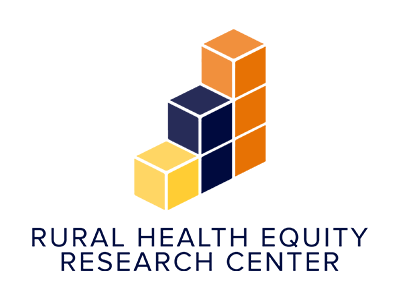
East Tennessee State University received one of only eight highly competitive federal Rural Health Research Center grants this month, providing four more years of funding for the ETSU/NORC Rural Health Research Center (RHERC).
Awarded by the Health Resources and Services Administration (HRSA), Federal Office of Rural Health Policy, the four-year award totals $2.8 million and will provide funding for the RHERC to continue conducting robust research as it relates to rural health.
The RHERC is a joint venture between ETSU’s Center for Rural Health and Research, part of the ETSU College of Public Health, and NORC at the University of Chicago’s Walsh Center for Rural Health Analysis. This successful partnership has brought together NORC's long history of rural health research and evaluation and ETSU's commitment to honor its rural heritage through research, education, and service. Read more...
Meit comments on health care access for rural communities of color

It’s more common for people in rural areas to die earlier than urban residents from things like heart disease, cancer and stroke, according to the Centers for Disease Control and Prevention. But hospitals have closed throughout rural America in the last decade, leaving some of the 46 million people who live in these areas fewer options to get the care they need when they need it.
Tennessee is one of 10 states — many of them in the South — that haven’t expanded Medicaid. Michael Meit, the director of East Tennessee State University’s Center for Rural Health Research, believes doing so would be an obvious solution to the problem of growing rural health disparities. More people would be covered by insurance, Meit said, and hospitals could make more money. “They’re providing a lot of uncompensated care,” he said of rural health systems in those states. Read more...
Institute awarded grant from Public Health Infrastructure Grant Program

The Tennessee Institute of Public Health (TNIPH) was awarded $60,000 by the Mississippi Public Health Institute (MSPHI) to assist with offering technical assistance, training, resources, and materials as part of the Public Health Infrastructure Grant Program (PHIG). PHIG’s goal is to strengthen public health infrastructure, workforce, and data systems in communities, public health departments, and organizations across the nation.
Dr. Randy Wykoff, public health dean, said, “It is a tremendous reflection on the expertise in the Tennessee Institute of Public Health, the Tennessee Public Health Training Center and the Center for Rural Health and Research, that they have been asked to help with workforce development in Mississippi.” Read more...
Center releases fourth annual report

East Tennessee State University’s Center for Rural Health and Research in the College of Public Health highlights the Center’s continued growth in its fourth annual report. Over the past year, CRHR welcomed three new faculty, and four new staff members, engaged with five new funders, co-authored 34 publications and presented at well over 100 conferences across the nation.
“This past year has been another outstanding year of growth and visibility for our
center,” said Michael Meit, director of the Center for Rural Health and Research.
“I could not be prouder of the team that we have developed – their passion, commitment
and expertise shine through in all that we do. They bring well-deserved recognition
to ETSU, our College of Public Health, and our region.” Read more...
Huang publishes on HIV prevalence in Africa

Qian Huang, research faculty in the East Tennessee State University College of Public Health’s Center for Rural Health and Research has published a co-authored opinion paper in The Lancet HIV titled "Moving Beyond Hotspots of HIV Prevalence to Geospatial Hotspots of UNAIDS 95-95-95 Targets in Sub-Saharan Africa." This paper discusses the limitations of focusing solely on traditional HIV prevalence hotspots, which often overlook critical elements such as treatment access and healthcare quality.
Diego Cuadros of the University of Cincinnati is lead author of the article. Additional co-authors include members of the International Initiative for Impact Evaluation, ICAP at Columbia University, the Ministry of Health and Child Care in Zimbabwe, the National Aids Council of Zimbabwe, the Zimbabwe Network for People Living with HIV, the University of Hawaii, and the New York University School of Medicine. Read more...
ETSU leading effort to address health professional shortages, economic development in Appalachia

East Tennessee State University’s Center for Rural Health and Research is leading an effort to address health care workforce challenges, foster economic development and promote regional prosperity in Central Appalachia. Dubbed the Regional Public Colleges and Universities (RPCU) Central Appalachia Health Consortium, this ground-breaking initiative is part of the Appalachia Regional Commission’s Appalachia Regional Initiative for Stronger Economies.
In addition to ETSU, universities that are part of this collaboration include Appalachian State University, Eastern Kentucky University, Marshall University, Ohio University, Radford University and Shawnee State University. At ETSU, this venture will be led by Dr. Nicholas Hagemeier, the university’s vice provost for Research, and Michael Meit, director for the Center for Rural Health and Research in the ETSU College of Public Health. Read more...
Balio featured on Exploring Rural Health podcast

Casey Balio, PhD, Research Assistant Professor at East Tennessee State University's Center for Rural Health and Research and part of the ETSU/NORC Rural Health Research Center, is the featured guest on the May edition of the “Exploring Rural Health” podcast. In the interview, Balio discussed the RHERC’s recent study on the use of the Area Deprivation Index (ADI) in rural health research.
“The ADI is a really important area-level measure of deprivation that is being used by federal, state, and local agencies as well as healthcare organizations to align resources with need. As such, the Federal Office of Rural Health Policy (FORPH) was interested in learning more about what we know and don’t know about the ADI,” said Balio. “This discussion really just scratches the surface of what we’re finding in this space, and we can’t wait to share more soon.” Read more...
RHERC study examines the use of the Area Deprivation Index in rural applications

“Use of the Area Deprivation Index and Rural Applications in the Peer-Reviewed Literature” is now available on the Rural Health Research Gateway. The study is the latest project of the East Tennessee State University/NORC Rural Health Equity Research Center.
The Area Deprivation Index (ADI) was developed to capture area-level social deprivation
for use in policy and research. Researchers reviewed existing peer-reviewed literature
regarding the use of the ADI. They then conducted a quantitative analysis to compare
its use in rural versus urban communities.
“There is increasing interest in using these area-level measures of risk in policy
and practice, including the ADI,” said lead author Dr. Casey Balio. “While they are
being widely used, there is a need to better understand what we know about how they
relate to health outcomes and differ by important characteristics of individuals and
communities, including rurality.” Read more...
Report by ETSU CRHR shows Kentucky leads nation in efforts to treat substance use disorder

The ETSU Center for Rural Health and Research study — “Kentucky’s Capacity for Substance Use Disorder Treatment Exceeds Nation” — found that the commonwealth ranked #1 in the United States in residential treatment beds per capita, with 70.34 beds per 100,000 population. This figure was more than double the rate of the bordering Appalachian states of Ohio (31.23), West Virginia (30.08), Tennessee (29.61), and Virginia (10.27).
Just three years ago, drug overdose mortality in Kentucky ranked the fourth highest in the nation. “However, unlike similar states in the region,” noted the report, “Kentucky has become a leader in creating strong Recovery Ecosystems, including enhanced capacity for substance use disorder treatment.” The study showed that this capacity has in turn yielded dramatic results — as 14 of the top 20 counties nationwide reporting the greatest reduction in overdose mortality were located in Eastern Kentucky. Read more...
Photo credit: Addiction Recovery Care
CRHR & KHI Publish Rural Service and Resource Sharing Guide

“Service & Resource Sharing in Rural Settings: A Perspective Report” is now available to help local health departments increase and improve services by sharing resources across jurisdictions.
The resource was developed for the Center for Sharing Public Health Services at the Public Health Accreditation Board (PHAB) by Wyatt J. Beckman at the Kansas Health Institute (KHI), and Haleigh Leslie, Christen Minnick, Olivia Sulivan and Nneoma Ubah at the Center for Rural Health and Research at East Tennessee State University (ETSU).
Service and resource sharing arrangements (SRSAs) allow rural local health departments (LHDs) to solve problems that cannot be solved — or easily solved — by a single health department. When rural LHDs and their partners share staff, expertise, funds, and programs across their respective boundaries, they can accomplish more together than they could do alone. This practice can enable rural LHDs and their partners to offer programs that otherwise would not be feasible. It can also be a powerful tool to advance health equity and improve the community's access to and delivery of public health services.
Rural Service & Resource Sharing Arrangements Report
Balio named 2024 Rural Health Fellow

Dr. Casey P. Balio has been named a 2024 Rural Health Fellow for the National Rural Health Association. NRHA announced its incoming class of Rural Health Fellows on October 27, 2023. 17 fellows were selected to participate. The yearlong intensive program aims to develop leaders who can articulate a clear and compelling vision for rural America.
"We are delighted that Dr. Casey Balio will be participating in this year's class of NRHA Rural Health Policy Fellows,” said Michael Meit, director of ETSU Center for Rural Health and Research. “She is a talented rural health researcher and will bring a strong and grounded research perspective to NRHA. We are fortunate to have her as part of our ETSU research team."
“I’m excited for this opportunity to be engaged with policymakers and experts across the country who are passionate about rural communities,” said Balio. Read more...
Shaping the future of elder care

East Tennessee State University’s Center for Rural Health and Research and TennCare are teaming up to host the East Tennessee Aging Symposium on Friday, Sept. 29.
The event will give community-based organizations the opportunity to shape the development of Tennessee’s Multisector Plan for Aging (MPA). Participants will have the opportunity to hear from Tennessee Health Commissioner Dr. Ralph Alvarado, as well as representatives from TennCare, AARP Tennessee and faculty from the ETSU’s Center for Rural Health and Research.
"Collaborating with communities and organizations across the state that are dedicated to the well-being of our aging population is an important step in making sure Tennessee is well-positioned to meet the challenges and opportunities of caring for our elderly population," said Anna Lea Cothron, systems transformation director for the Division of TennCare. Read more...
CRHR collaborates with CARE Women's Health on child and maternal health research in Western North Carolina

East Tennessee State University’s Center for Applied Research and Evaluation (CARE) in Women’s Health was recently awarded two separate grants to research child and maternal health outcomes as well as the intersection of postpartum contraception and infant feeding throughout Western North Carolina.
CARE Women’s Health, part of ETSU’s College of Public Health, is committed to improving the lives of women and their families through education, clinical practice and research. Both projects are funded by the Dogwood Health Trust, a private foundation that works to improve the health and well-being of those living in the 18 counties and the Qualla Boundary in Western North Carolina.
Examining Kentucky’s pilot program to treat non-violent offenders with behavioral health issues

The Commonwealth of Kentucky is taking lessons learned from its judicial substance abuse treatment program to help offenders with behavioral health issues. On July 25, 2023, East Tennessee State University’s Center for Rural Health and Research, housed in the College of Public Health, invited Judge Kevin Mullins to speak about the program. Kentucky Senate Bill 90 created a pilot program to divert some qualifying low-level offenders away from jail and into treatment for substance use disorder or mental health issues.
The Letcher County District Judge helped create the Community Liaison Program which
helps non-violent offenders obtain inpatient treatment for substance use disorders.
The program promotes early identification and linkage to treatment services while
working collaboratively with community partners. The Community Liaison Program has
assisted 7,642 (2020-2021) in obtaining inpatient treatment for substance use disorders.
Read more...
ETSU Center for Rural Health and Research releases third annual report

Since its founding in 2019, East Tennessee State University’s Center for Rural Health and Research in the College of Public Health has secured more than $12 million in funding from national, state and regional partners to research issues that impact our communities.
Over the past year, CRHR has added eight additional funding sources totaling $1.5 million. This is highlighted in the center’s third annual report, which was released this month.
“As a center we are defined by our people. Our successes over this past year highlight their dedication, their amazing skills, and their ongoing commitment to our communities, our region and to rural jurisdictions around the nation,” said Director Michael Meit. “Our continued growth, in terms of both faculty and research support, is a direct result of the stellar reputation they have helped to create.” Read more...
Pettyjohn publishes cross-sectional mask study

Sam Pettyjohn, Assistant Professor for the East Tennessee State University College of Public Health’s Center for Rural Health and Research, co-authored an article in the Journal of American College Health. The article “Knowledge, attitudes, and behaviors with mask use and vaccines for COVID-19 prevention at 13 colleges and universities, April 2021” was published online on May 2, 2023.
The cross-sectional study included colleges and universities in eight states (Alabama, Kentucky, Maryland, Michigan, New York, Pennsylvania, Tennessee, and West Virginia) participating in an observational surveillance effort, the Mask Adherence Surveillance at Colleges and Universities Project (MASCUP!). Read more...
2023 Appalachian Research Day held

Appalachian Research Day, also known as "Come Sit on the Porch," is an annual conference hosted by the University of Kentucky Center of Excellence in Rural Health (UK CERH) to share results of health research conducted with communities in Appalachia. This year's event was held in person on April 5 at the Ramada by Wyndham Hotel and Conference Center in Paintsville.
Other conference highlights included “Building Recovery Ecosystems in Central Appalachia,"
by Michael Meit, co-director of the East Tennessee State University Center for Rural
Health and Research, and Andrew Howard, director of Policy Fletcher Group.
Read more...
The CDC Lacks a Rural Focus. Researchers Hope a Newly Funded Office Will Help.

Rural data analysis poses challenges because of the smaller size of rural population centers compared with the larger populations of urban areas. For instance, small communities might not have adequate response rates to surveys, which can limit the conclusions researchers can make about the data.
Michael Meit, co-director of the Center for Rural Health and Research at East Tennessee State University, said the 2017 series helped to mitigate the “small numbers” challenge, wherein samples aren’t large enough to be properly analyzed because rural areas have smaller populations. Read more...
Appalachian Diseases of Despair research study released

“This is now the third time that we have analyzed these data for the Appalachian region. Our analysis of 2018 data left us with optimism as we had seen a modest decline in overdose mortality. That was short-lived, however,” said Meit, director of ETSU’s Center for Rural Health and Research in the College of Public Health and NORC senior fellow, who led the research study.
“Our latest data, from 2020, include the first year of the COVID-19 pandemic, which
created new stressors in our region, and we have seen rates spike once again. We need
to leverage the strength, resilience and creativity of our Appalachian people to regain
our lost footing and re-establish the progress that we were making in 2018.” Read more...
Beatty publishes on grandparents as caregivers

Substance use disorders (SUDs)—and opioid use disorder in particular—have become increasingly prevalent and detrimental over the past decade, including in Appalachia. The consequences of SUD can be significant not only for the person experiencing the disease, but also for their families and communities.
Research has shown that the rise in drug overdose deaths and drug-related hospitalizations
is positively associated with the rise in foster care cases, even after accounting
for county-specific socioeconomic and demographic characteristics. Appalachia in
general has experienced markedly elevated rates of both overdose deaths and foster
care entries since 2012. Read more...
Rural Local Health Departments: Share Your After-Action Reports

NACCHO is collaborating with The East Tennessee State University (ETSU) Center for
Rural Health and Research (CRHR) to assess public health emergency preparedness (PHEP)
among rural local health departments. Through the grant, ETSU and NACCHO will be developing
rural-specific PHEP capabilities through assessment activities and listening sessions
across various states. Part of this project includes a needs assessment to identify
shared challenges, gaps, and needs among rural local health departments (LHDs) as
they pertain to meeting the PHEP Capabilities established by the CDC. A key component
of the needs assessment includes a review of past After-Action Reports (AARs) from
rural local health departments. Read more...
ETSU rural health researchers shed light on our neighbors outside the city limits
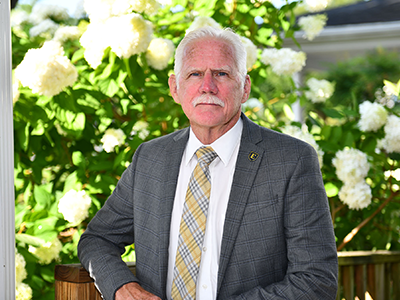
When looking at health data broken down by state, Tennessee ranks relatively low compared to other states around the U.S. A list by U.S. News ranked Tennessee at 40 for healthcare, which took into account public health, healthcare access and healthcare quality.
“We’re one of the least healthy states, but that actually hides an underlying problem, and that is, within Tennessee, there are huge variations,” said Randy Wykoff, dean of the College of Public Health at East Tennessee State University (ETSU). “We have about five relatively wealthy, largely urban counties, and then we have a number of counties that are among the poorest and most rural in America. In those counties, we really see significantly worse health challenges.” Read more...
ETSU Center for Rural Health and Research publishes results of mask study

“Mask Adherence to Mask Mandate: College Campus Versus the Surrounding Community” was published online today in the Journal of Community Health. The paper is a student-conducted research project overseen by research assistant professor Samuel Pettyjohn, DrPH from East Tennessee State University’s Center for Rural Health and Research, located in the College of Public Health.
Eight ETSU graduate-level public health students conducted an observational study at five on-campus sites and five off-campus sites in Johnson City from February 8, 2021, to April 30, 2021. When the observations began, mask mandates were in place both on-campus and in Washington County, Tennessee.
On February 20, 2021, the county-wide mask mandate in Washington County was lifted, but the campus mask mandate remained in effect. Data recorded included if individuals wore a mask, the type of mask and if the mask was worn correctly. Read more...
Meit Elected to American Public Health Association Governing Council

Michael Meit, director of East Tennessee State University College of Public Health Center for Rural Health and Research, has been elected to the Governing Council of the American Public Health Association (APHA) Medical Care Section.
“I am honored to serve as a Governing Councilor for the American Public Health Association’s Medical Care Section,“ said Meit. “APHA represents all of us working in the public health profession as we seek to achieve health equity. I look forward to bringing a rural voice to APHA’s deliberations so that we can ensure that where you live doesn’t determine your opportunity to live a healthy and productive life.”
According to the APHA, The Medical Care section explores the organization and practice of medical care in the U.S. as well as the social, economic, and environmental conditions that influence health.
The APHA advocates for laws and regulations at a federal level that will advance the public’s health. The Washington, DC-based public health organization for public health professionals has more than 25,000 members worldwide.
JPHMP announces the consortium for workforce research in public health

"The public health workforce has the spotlight and Congress has invested over 10 billion dollars in funding to governmental agencies to support public health workforce development. CWORPH’s forthcoming research can support public health partners in building on this investment to grow and sustain the workforce.
We plan to develop academic products that show the work that we do is rigorous and
scientifically based but, at the end of the day, we want to translate our work into
practice and get it into the hands of practitioners in a way that makes sense to folks’
everyday lives and to their work. CWORPH is committed to supporting public health
practice. Our intention is not to merely learn from those working in health departments,
but to work with them collaboratively to create products that are useful to health
departments and will make an impact in communities across the nation." Read more...
Mental Health Treatment Is Becoming Less of a Taboo Subject with Rural Residents, New Study Shows
New research from the Rural Health Equity Research Centers at East Tennessee State University finds that rural residents are less likely to have negative attitudes toward those with mental health illnesses than previously thought. Prior studies had found that there was more of a stigma around mental illness in rural communities.
According to researchers Kate Beatty and Michel Meit, previous studies found that perceived prejudice against rural residents with mental health concerns not only reduced treatment but that rural residents felt that treatment wouldn’t work. For instance, a study of Appalachian parents of children with mental health concerns in 2015 found that 28% of parents worried about others finding out their child was being treated for a mental illness, compared to 22% of parents in urban areas. Another study that same year found that older rural residents have higher levels of public and self-stigma than older adults in urban areas. Read more...
How Ready Is Your County to Help with Addiction Recovery?

A new national index from the Center for Rural Health and Research at East Tennessee
State University called the Recovery Ecosystem Index Mapping Tool drills down to the
county level to assess drug recovery systems across the country.
The mapping tool, created in association with the National Opinion Research Center
(NORC) at the University of Chicago and the Fletcher Group, shows the recovery resources
available in every county in the United States. The index then rates each county by
comparing resources and demographic information against the county’s overdose mortality
rates. Read more...
Casey Balio publishes on pandemic workforce competency gaps

“In this study, we were able to use a nationally representative survey of public health workers to understand where they report gaps in key public health competencies and correlations to characteristics of the workforce,” explained lead author of the study Dr. Casey P. Balio, Center for Rural Health and Research faculty member and Research Assistant Professor in the Department of Health Services Management and Policy.
“We found that more than 20% of the workforce perceived gaps in most of the areas assessed, and that those hired for COVID-19 response reported significantly fewer gaps in most areas than the traditional workforce,” Balio said. “Findings from this study may be helpful as public health continues to respond to the COVID-19 pandemic and adjust to the changing demands on the field.” Read more...
ETSU part of $4.7 million consortium to lead public health workforce research
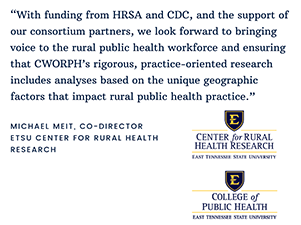
Supported with a first-of-its-kind joint $4.7 million cooperative agreement from the Health Resources and Services Administration (HRSA) and the Centers for Disease Control and Prevention (CDC), six U.S. universities have come together to conduct robust public health workforce research, evaluation and analysis:
University of Minnesota
Johns Hopkins University
Columbia University
Indiana University
University of Washington
East Tennessee State University
The unique collaboration is called the Consortium for Workforce Research in Public
Health (CWORPH). Led by the Center for Public Health Systems at the University of
Minnesota School of Public Health (SPH), CWORPH’s research will look at what drives
turnover, ways to recruit and retain staff and how to fill workforce gaps. The consortium
also includes several national practice-oriented partners, such as the National Association
of County and City Health Officials, Public Health Training Centers, and the de Beaumont
Foundation, who will help identify chronic and acute public health needs so CWORPH
can investigate them and deliver answers back to the community. Read more...
What’s the OD Death Rate in Your County?

If you’ve got a couple minutes, Michael Meit has a favor to ask. He’ll try not to take up too much of your time.
“What I want is for people to go to the online tool, click on their county, pull up that 8 ½-by-11 fact sheet, and send it to all their local elected officials, health department staff, medical personnel, and others,” Meit said.
And?
“Start a community dialog about drug overdose deaths in their community,” Meit said. Read more...
Fletcher Group, NORC and ETSU Launch Substance Use Recovery Tool

NORC at the University of Chicago, East Tennessee State University (ETSU), and the Fletcher Group, Inc. released a mapping tool that enables users to measure the strength of substance use recovery ecosystems for every county in the United States and explore associations with overdose deaths and other sociodemographic and economic factors. The term “recovery ecosystem” is used to describe the factors in a community that support individuals in recovery from substance use disorder.
The Recovery Ecosystem Index Mapping Tool integrates the Recovery Ecosystem Index, overdose mortality rates, and data on poverty, education, and other demographic factors for counties in each of the 50 states. Users can compare county-level information to the rest of their state and to the nation. The tool allows community organizations, policymakers, researchers, substance use treatment providers, other decision-makers, and the general public to explore county-level maps and create data dashboards to understand these factors in their communities and where additional resources are most needed to provide support to individuals in recovery. Read more...
Kate Beatty wins Distinguished Faculty Award in Research

Dr. Kate Beatty, a public health researcher whose work focuses on rural and Appalachian health and advancing health care for rural and low-income women, has won East Tennessee State University’s Distinguished Faculty Award for Research.
It is the highest research honor that ETSU presents to a faculty member.
A faculty member who wrote a letter in support of her nomination noted that Beatty’s work “is both practical and policy-relevant – critical attributes for meaningful research in the public health arena.” Read more...
Michael Meit quoted on medical deserts

Michael Meit, Co-Director of the East Tennessee State University College of Public Health Center for Rural Health and Research, was quoted in the Washington Examiner on the topic of medical deserts.
In the Washington Examiner series, Dried Up: America's Medical Deserts, the Washington Examiner will investigate what happened to vast regions of the country that have seen medical services evaporate over the past decade.
ETSU Center for Rural Health and Research releases second annual report

The Center for Rural Health and Research, at the ETSU College of Public Health has released it second annual report.
Through partnerships on the state, regional and national level, the Center has secured over eight million dollars of additional funding.
“We are so proud of all the Center has accomplished over the past three years. We have recruited world-class faculty and staff, engaged with partners locally, regionally, statewide and across the nation, and have developed a reputation as a trusted evaluator and research partner,” said co-director Mike Meit. Read more...
Record number of fatal overdoses underscores need for resources, urgency

After consecutive years in decline, fatal overdoses in West Virginia soared to an all-time high in 2020.
"Of course this is discouraging, but in the context of [the pandemic], I don't think it was a surprise,'" Meit observed. "It's discouraging beyond the obvious reasons, whic are the humber of people we've lost - too many - but we were making real progress prior to the pandemic, and that's been turned back now."
Dr. Casey Balio co-authors study on Medicaid expansion administrative spending

A number of states found ways to expand Medicaid without increasing their administrative spending, according to the results of a 10-year study published last month in the journal Health Affairs.
Dr. Casey P. Balio of East Tennessee State University is the lead author of the study, which was selected for the November issue of Health Affairs that focuses on “Hospitals, ACA Marketplace & More.” Balio is a research assistant professor at the Center for Rural Health and Research and the Department of Health Services Management and Policy in the ETSU College of Public Health. Read more...
Rural resiliency key to improving Virginia health inequities
Michael Meit, director of research and programs in the Center for Rural Health and Research at East Tennessee State University, pointed out poverty underpins inequities in regions like Appalachian Virginia. He thinks the media sometimes paints negative pictures when reporting on these gaps, which might lead business leaders to back away from investing there.
"The phrase that is often used in describing our rural communities, and I think it's great for advocacy, but it's terrible for bringing in investment, is 'older, poorer and sicker,'" Meit observed. "And, frankly, we need to get away from that. And we need to start talking about assets in our rural communities. They are creative, they are hard-working." Read more...
Poverty underlies challenges to health care
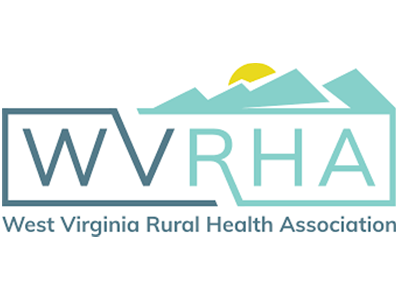
In a presentation titled “Health Equity, Poverty and Rural Resilience,” Michael Meit summed up a recurrent theme across the more than 30 sessions that made up the West Virginia Rural Health Association’s (WVRHA) 29th annual conference, hosted virtually from the West Virginia School of Osteopathic Medicine (WVSOM) campus.
“I believe poverty is the major underlying factor that sets up our rural regions for a lot of the challenges we face,” said Meit, who serves as director of research and programs for East Tennessee State University’s Center for Rural Health and Research.
Michael Meit quoted in USA Today story

Michael Meit, Director of Research and Programs for the East Tennessee State University College of Public Health’s Center for Rural Health and Research, has been quoted in a USA Today article, "Long COVID-19 amplifies chronic health care challenges in rural America," day three of a weeklong USA TODAY Network series exploring long-haul COVID-19, the people who’ve suffered and the experts trying to help them.
“You put these three factors together: more (coronavirus) spread, a higher-risk population, and less access to specialty care – you get a complex long-term challenge in these communities,” said Michael Meit, the director of research and programs at the Center for Rural Health and Research at East Tennessee State University. “This is going to have a generational impact.” Read more...
Michael Meit publishes on Appalachian Diseases of Despair

Michael Meit, Director of Research and Programs for the East Tennessee State University College of Public Health’s Center for Rural Health and Research, has co-authored an article in the Journal of Appalachian Health. The article, “Tracking the Impact of Diseases of Despair in Appalachia—2015 to 2018,” provides an update on mortality due to diseases of despair within the Appalachian Region, comparing 2015 to 2018.
The concept of diseases or deaths of despair originated from research by Case and Deaton that highlighted rising morbidity and mortality among white non-Hispanic Americans from three main causes: alcoholic, prescription drug, and illegal drug overdose; suicide; and alcohol liver disease/cirrhosis of the liver. The initial Case and Deaton article was published in 2015, at a time when life expectancy in the U.S. fell for the first time in decades, and many researchers began to hypothesize what may be contributing to this decline. This also marked the beginning of the surge in drug overdose deaths in the U.S., driven by rapid increases in deaths from synthetic opioids, such as fentanyl. Read more...
ETSU students put Johnson City on the map in CDC mask wearing study

A team of graduate students from East Tennessee State University College of Public Health have been busy placing Johnson City on the map as they conclude four months of local observations for the Centers for Disease Control and Prevention’s (CDC) national MASCUP! study.
Under the direction of Dr. Sam Pettyjohn, research assistant professor, ETSU is one of 66 locations nationwide chosen to assess mask wearing behaviors at U.S. colleges and universities as part of a larger “Mask Adherence Surveillance at Colleges and Universities,” or MASCUP!. Students have collected field data gathered on and off campus.
Since February, Pettyjohn and 11 students in the Master of Public Health program have canvased ETSU and other designated locations in Johnson City where they have studied the rates mask wearing behaviors and local adherence to CDC COVID-19 prevention guidelines, and how these rates changed over time. A total of 10 sites, five on campus and five in Johnson City, such as national retail and grocery chains or other local businesses, were chosen for their high foot traffic and proximity, then observed unobtrusively throughout the course of approximately 3,000 total observations during the spring semester—one of the longest such studies in the national study. Read more...
Mike Meit Interviewed by the Atlantic

Vaccine hesitancy is now the chief focus for rural-health experts. They have an obligation to change minds, and fast. But persuasion works only with trustworthy messengers, such as local leaders, physicians, and pharmacists—people who already have relationships and friendships with community members, who share similar values, and whose children go to school together.
“Rather than have these mass-vaccination sites through government-funded health departments with the National Guard” overseeing operations, health officials need to send vaccines straight to places such as doctors’ offices, churches, and familiar local clinics, Michael Meit, the research director at East Tennessee State University’s Center for Rural Health and Research, told me. “It’s those relational pieces that are so, so important in our rural communities.” Read more...
Center for Rural Health and Research Faculty Assist with COVID-19 Report

Researchers at the University of Kentucky have released COVID-19 Stakeholder Experiences in Kentucky, a report that details the findings of surveys taken during the summer and fall of 2020. The survey was designed and implemented by researchers at UK, with the analysis being completed by the ETSU Center for Rural Health and Research.
The survey was designed and implemented by researchers at UK, with the analysis being completed by the Center for Rural Health and Research at the East Tennessee State University College of Public Health. Kentucky Homeplace community health workers assisted with getting surveys to participants in hard-to-reach, underserved populations. Dr. Sam Pettyjohn and Dr. Amy Wahlquist, ETSU faculty, led the analysis for the report. Read more...
Michael Meit Featured on Rural Health Issues Segment

On March 8, 2021, Michael Meit, Director of Research and Programs for the East Tennessee State University College of Public Health’s Center for Rural Health and Research, was featured on InvestigateTV’s first segment of “Bridging the Great Health Divide.” The segment explores inadequate access to healthcare for millions of Americans.
InvestigateTV analyzed data from the Centers for Disease Control and Prevention, the U.S. Health Resources and Services Administration, the Robert Wood Johnson Foundation and numerous other federal, state and private sources and found that there are serious health disparities between Appalachia and the Mississippi Delta and the rest of the United States. Read more...
College of Public Health Faculty Publish on Global Water Safety

Drs. Bethesda O’Connell, Megan Quinn, and Phil Scheuerman, faculty in the East Tennessee State University College of Public Health, are co-authors of an article recently published in Waterlines. The article, Linkage between water, sanitation, hygiene, and child health in Bugesera District, Rwanda: a cross-sectional study, assesses the connection between specific hygienic practices with the reduction of childhood diarrhea in Rwanda.
Dr. Theoneste Ntakirutimana, lead author of the article, is an environmental health expert at the University of Rwanda. Dr. Ifeoma Ozodiegwu, alumna of the ETSU College of Public Health doctoral program, is a co-author. Additional co-authors include members of WaterAid Rwanda and the University of Rwanda. Read more...
Tennessee Institute of Public Health Highlighted by County Health Rankings and Roadmaps

The Tennessee Institute of Public Health, housed within the East Tennessee State University College of Public Health, was recently highlighted by the County Health Rankings and Roadmaps’ County by County blog. The post, Building Roadmaps to Better Health in Tennessee, discussed the institute’s data-guided approach to community change.
Since its inception in 2011, the County Health Rankings and Roadmaps coaching program has partnered with individuals and teams in nearly every state across the United States to help them identify and work toward their health and equity goals. Over the next five months, the blog’s authors will be speaking with five CHR&R Action Learning Coaches and the communities they've coached to learn more about how they worked together to move with data to action. Read more...
Michael Meit Quoted in 100daysinappalachia Article

In 2017 and 2018, the U.S. experienced a decline in drug-overdose deaths, and the overall mortality rates declined in both Appalachia and beyond. But Mike Meit warns that the COVID-19 pandemic places those encouraging trends in peril.
The results of subsequent research indicate the extent to which Appalachia has suffered such deaths. In November, the Appalachian Regional Commission released a report titled “Appalachian Diseases of Despair,” from research conducted by the Walsh Center for Rural Health Analysis at the University of Chicago and the Center for Rural Health and Research at East Tennessee State University.
MPH Student Justin Kearley Co-Authors Textbook Chapter

Justin Kearley, epidemiology student in East Tennessee State University College of Public Health Master of Public Health program, has co-authored a chapter in the textbook, Bridging the Family Care Gap. The chapter, “Public health perspectives on the family care gap,” discusses the anticipated shortfall between the number of people who will need care or assistance because of chronic conditions or disability and the number of family members and friends in the community available to provide that care.
The author of the book, Joseph Gaugler, is a Professor in the School of Nursing and Center on Aging at The University of Minnesota. Authors of the chapter include members of Appalachian State University, Oregon Health & Science University, and the Centers for Disease Control and Prevention. Read more...
Michael Meit Elected to NRHA Rural Health Congress

Michael Meit, Director of Research and Programs for the East Tennessee State University
Center for Rural Health and Research, has been elected by the National Rural Health
Association’s Rural Health Congress. The Rural Health Congress is the policy-making
body of the National Rural Health Association, responsible for developing the association's
positions on public policy. Elected representatives from the association's constituency
groups, State Association Council, State Office Council, issue groups, and officers
serve on the Congress, giving broad grassroots representation that reflects the expertise
and passion of NRHA's membership.
“It has been an honor to serve NRHA in a variety of capacities over the years, and I look forward to serving on the Rural Health Congress”, stated Meit. “Throughout my over 20 years of membership, I continue to be impressed by the association’s commitment to serving rural communities, and their bipartisan approach to making sure the needs of rural residents are front and center with policy makers and agency leaders.” Read more...
Center for Rural Health and Research Authors Article on COVID-19 and Substance Use Disorders

Kate Beatty and Michael Meit, faculty in the East Tennessee State University College of Public Health’s Center for Rural Health and Research, have co-authored an article in the Journal of Appalachian Health. The article, Rural Appalachia Battling the Intersection of Two Crises: COVID-19 and Substance Use Disorders, discusses rural Appalachia’s great risk of unforeseen side effects of the COVID-19 pandemic, including increased mortality from substance use disorders.
Margaret Miller, alumna of East Tennessee State University’s MD/MPH program, is lead author of the article. Rebekah Rollston, co-author, is also an alumna of this joint degree between the College of Public Health and the Quillen College of Medicine. Read more...
Appalachia's Diseases of Despair mortality rates higher than rest of the nation

Appalachian Diseases of Despair, a new report from the Appalachian Regional Commission
finds that despite overall declining mortality rates from diseases of despair (overdose,
suicide, and liver disease) between 2017-2018, the Region’s diseases of despair mortality
rate in 2018 was still 36 percent higher than the rate for the non-Appalachian United
States. Moreover, among Appalachians in the prime working ages of 25-54, the diseases
of despair mortality rate was 43 percent higher in the Region than the rest of the
country. The report also found that for women, the diseases of despair mortality rate
was 46 percent higher in the Appalachian Region than in the rest of the country; while
for men, the diseases of despair mortality rate was 31 percent higher in the Region
versus the rest of the country.
“The ongoing disparities within Appalachia related to diseases of despair have broad impacts on our Region’s children, families, and our communities,” says Michael Meit, director of research and programs for ETSU’s Center for Rural Health and Research and NORC senior fellow, who led the research study. “While mortality rates declined in 2018, we know that COVID-19 has created new stressors that are once again resulting in spikes in deaths due to diseases of despair. We need to leverage the strength, resilience, and creativity of our Appalachian people to make sure that progress made in 2018 is not fleeting.”
ETSU College of Public Health COVID-19 videos surpass 25,000 views

Throughout the pandemic, East Tennessee State University’s College of Public Health has mobilized its expertise and resources, posting almost 100 COVID-19 educational videos, updates, and public service announcements, which have surpassed 25,000 views.
“Our goal is to share useful information about the pandemic as widely as possible,” said Dr. Randy Wykoff, dean of the College of Public Health. “Since COVID-19 is the dominant public health concern currently facing our nation, we knew the videos would get attention. But when we decided to look at the numbers, we were excited to see how many times these videos have been viewed.” Read more...
Tennessee Institute of Public Health Awarded Appalachian Regional Commission Grant

The Tennessee Institute of Public Health at the East Tennessee State University College of Public Health has been awarded a second grant from the Appalachian Regional Commission to further expand the “Correctional Career Pathways” program in Appalachian Tennessee. The first of its kind in the state, and possibly nationally, the Correctional Career Pathways program began in the Greene County, Tennessee Workhouse in 2015. The program gives non-violent offenders in local jails the opportunity to break the cycle of arrest and incarceration and transition into the workforce.
TNIPH was successful during 2018-2019 in developing a framework to provide a well-defined roadmap and technical assistance to replicate the program in Grundy and Scott counties, two “distressed” Appalachian Tennessee counties. Read more...
Michael Meit Publishes Book Chapter on Appalachian Addiction

Michael Meit, Director of Research and Programs for the East Tennessee State University College of Public Health’s Center for Rural Health and Research, has authored a chapter in the recently released book, From the Front Lines of the Appalachian Addiction Crisis. The chapter, “Data Make You Credible, but Stories Make You Memorable,” discusses the importance of remembering the lives and families of those affected by the addiction crisis.
Meit’s journey with exploring substance misuse in the Appalachia resulted in a 2008 report for the Appalachian Regional Commission that analyzed mental health and substance use disparities, and access to treatment in the region. The NORC Walsh Center for Rural Health Analysis, co-directed by Meit at the time, found that communities impacted by methamphetamine were actually even more affected by prescription drug use and illicit opioids. Read more...
ETSU awarded one of seven Rural Health Research Centers by HRSA

East Tennessee State University received one of seven Rural Health Research Center grants, awarded by the Health Resources & Services Administration (HRSA), Federal Office of Rural Health Policy, to create the Rural Health Equity Research Center.
The $2.77 million award, which ETSU won in collaboration with the NORC Walsh Center for Rural Health Analysis, part of NORC at the University of Chicago, spans four years.
According to HRSA, the goal of the Rural Health Research Center program is “to conduct rural research to assist providers and policy-makers at the federal, state and local levels to better understand problems faced by rural communities. This research informs population health improvement efforts, including health care access and delivery.” Read more...
ETSU, Virginia Tech awarded $2.6 million grant for opioids research
The National Institute on Drug Abuse recently awarded a $2.6 million grant to researchers at East Tennessee State University and Virginia Tech to develop studies on how best to provide support services for individuals being treated for opioid use disorder.
The Studies To Advance Recovery Support (STARS) Network, which will involve researchers across multiple universities and health care systems, will center on the urgent need for research to advance recovery support services in Central Appalachia. The goal of the partnership is to build research networks and capacity around addiction recovery support services in general and specifically around those people who are using medications to treat their opioid use disorder in combination with counseling and other support services. Read more...
ETSU Health experts assist with plans to protect safety and health of campus, clinics

A team of experts from East Tennessee State University’s health sciences colleges is helping the university navigate important decisions and policies to protect the health and safety of the campus community and ETSU Health clinics during the COVID-19 pandemic.
Created in response to the pandemic, the Medical Response Team meets regularly to analyze disease trends, craft medical suggestions and aid in decisions and considerations regarding the safe return to campus.
“In addition to following recommendations from the Centers for Disease Control and local and state health officials, ETSU is fortunate to have an abundance of medical and public health experts who are carefully monitoring our local trends, as well as the resources and facilities we have here on our campus to ensure that we develop protocols and policies that protect our students, faculty, staff and visitors,” said Dr. Bill Block, vice president for clinical affairs and dean of Quillen College of Medicine. Read more...
Michael Meit featured on American Journal of Public Health podcast

Michael Meit, director of research and programs at the East Tennessee State University Center for Rural Health and Research, will be featured on a national podcast focusing on rural public health.
The podcast is hosted by Dr. Alfredo Morabia, editor-in-chief of the American Journal of Public Health (AJPH). It will be available beginning Aug. 5 at ajph.aphapublications.org.
“In this podcast, we discussed the implications of framing rural America as ‘older, poorer, sicker’ and ways that we could instead leverage rural strengths and assets to improve rural health and well-being,” Meit said. “The podcast will support an upcoming issue of AJPH on rural public health, where ETSU is front and center.” Read more...
Meit to join ETSU Center for Rural Health and Research

East Tennessee State University has named Michael Meit, a nationally respected leader in rural health, as the director of research and programs at the ETSU Center for Rural Health and Research.
Meit will step down as co-director of the Walsh Center for Rural Health Analysis at the non-partisan and objective research organization NORC at the University of Chicago, but he will retain his senior fellow role at NORC, creating opportunities to leverage synergies and expand partnerships between the two organizations.
“Michael Meit is one of the nation’s most respected leaders in rural health,” said Dr. Randy Wykoff, founding director of the ETSU Center for Rural Health and Research and dean of the College of Public Health. “Through his work with the Federal Office of Rural Health Policy, the National Rural Health Association, the U.S. Department of Agriculture, the Robert Wood Johnson Foundation, and many other organizations, Michael has become one of the most recognized voices advocating for real improvements in rural health in America.” Read more...
ETSU Establishes Center for Rural Health and Research

Dr. Randy Wykoff, dean of the ETSU College of Public Health, was named the founding director of the new Center for Rural Health and Research that will be housed within the college.
Tennessee Gov. Bill Lee announced the creation of the new center on Tuesday, July 16. According to Gov. Lee, ETSU will receive a $1.5 million first-year grant for the implementation of the center, and then a recurring $750,000 annual investment to support the ongoing operations. These appropriations were recommended by Gov. Lee and approved by the Tennessee General Assembly during the 111th legislative session.
In addition, Alan Levine, chairman and CEO of Ballad Health, announced the system would contribute more than $15 million to the center over the course of the next 10 years. The gift is the largest in ETSU history and the largest to date for the $120 million capital “Campaign for ETSU” launched in April.
The goal of the center will be to work with Ballad Health, local health care delivery partners, national experts, and the leadership of ETSU Health to identify new mechanisms to improve health in rural and nonurban communities. Specific emphasis will be placed on strategies that disrupt inter-generational cycles of behaviors that contribute to poor health outcomes, which ultimately can affect college- and career-readiness. Read more...
 Stout Drive Road Closure
Stout Drive Road Closure 